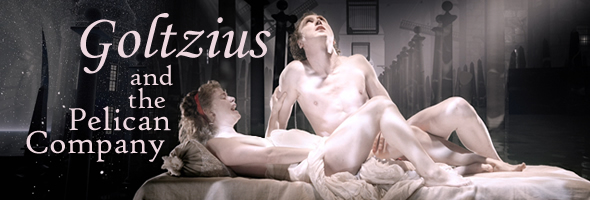
Color, 2014, 117m.
Directed by Peter Greenaway
Starring F. Murray Abraham, Giulio Berruti, Vincent Riotta, Halina Reijn, Flavio Parenti, Lars Eidinger, Anne Louise Hassing, Ramsey Nasr, Kate Moran
Axiom (Blu-ray & DVD) (UK RB/R2 HD/NTSC), Epicentre (DVD) (France R2 PAL) / WS (1.85:1) (16:9) / DTS-HD 5.1
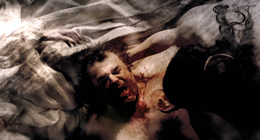 Never one to go for a commercial approach, Peter Greenaway has been quietly pushing the definition of cinema into some
Never one to go for a commercial approach, Peter Greenaway has been quietly pushing the definition of cinema into some 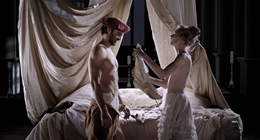 unusual places over the past three decades. How much of his experimentation has paid off is variable, of course, as his trademark combinations of layered digital imagery and writing, circuitous plotting, stylized performances, and wall-to-wall artistic nudity have resulted in films both popular and obscure since his incendiary 1989 hit, The Cook, the Thief, His Wife & Her Lover. The furthest extremes of his filmic excursions to date resulted in the largely ignored The Tulse Luper Suitcases trilogy (and its other permutations), which left him returning to more traditional narrative shores with the sumptuous Rembrandt conspiracy drama, Nightwatching.
unusual places over the past three decades. How much of his experimentation has paid off is variable, of course, as his trademark combinations of layered digital imagery and writing, circuitous plotting, stylized performances, and wall-to-wall artistic nudity have resulted in films both popular and obscure since his incendiary 1989 hit, The Cook, the Thief, His Wife & Her Lover. The furthest extremes of his filmic excursions to date resulted in the largely ignored The Tulse Luper Suitcases trilogy (and its other permutations), which left him returning to more traditional narrative shores with the sumptuous Rembrandt conspiracy drama, Nightwatching.
After that film marked a sort of return to form, Greenaway dabbled in more familiar territory with Goltzius and the Pelican Company, which manages to situate an Oscar winner (F. Murray Abraham) in the middle of a Chinese box narrative similar to his underrated play-versus-audience outrage, The Baby of Mâcon. In this case the audience is gathered to witness a series of performances enacting famous tales from the Old Testament, engineered by engraver and artist Hendrik Goltzius (Nasr) to persuade from funding from the wealthy Musgrave of Alsace (Abraham). Everyone is 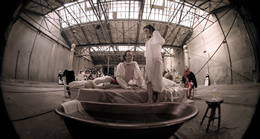 trapped inside the estate after a snowy trip, with the printing company's staff and officials partaking in the performances. As Goltzius himself points out early on, each technological advance inevitably becomes entangled with lechery, and in this case the Bible serves as a perfect springboard for undraped, sometimes extreme renditions parables including the Garden of Eden, Lot and his two daughter, David and Bathsheba, Samson and Delilah, and Salome and John the Baptist. The Musgrave himself and his cohorts also become
trapped inside the estate after a snowy trip, with the printing company's staff and officials partaking in the performances. As Goltzius himself points out early on, each technological advance inevitably becomes entangled with lechery, and in this case the Bible serves as a perfect springboard for undraped, sometimes extreme renditions parables including the Garden of Eden, Lot and his two daughter, David and Bathsheba, Samson and Delilah, and Salome and John the Baptist. The Musgrave himself and his cohorts also become 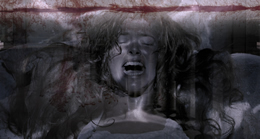 part of the proceedings, with their own personal proclivities quickly affecting the outcome.
part of the proceedings, with their own personal proclivities quickly affecting the outcome.
Complete with a massive cast of international actors largely culled from Italy and Holland, this is prime Greenaway territory with sprawling sets, enough bare flesh to rival his opulent Prospero's Books (though with more anatomical explicitness here), and a stream of heady ideas hurled at the viewer as each development triggers a rumination on art, wordplay, and history. It's also one of his lighter efforts thanks to the linear plotline, witty dialogue, and surprising avoidance of graphic violence; there's a bit of stage blood here and there, but considering the grisly nature of the source material (which is rife with beheadings and other mutilations), you could almost call this film restrained in its depiction of violence. The cast is generally adept at handling the tricky dialogue (some thick accents aside), with the hilarious Vincent Riotta stealing all of his scenes narrating to the audience and Giulio Berruti getting some of the weirdest moments trapped dangling in a gigantic cage for one lengthy passage.
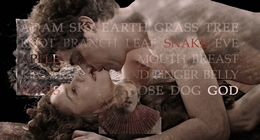 It's also heartening to see that Greenaway can still turn out a visually stunning film thanks to his now-regular cinematographer, Reinier van Brummelen, who stepped in after the death of the legendary Sacha Vierny. The visuals here are shockingly crisp and vivid at times, making one often wonder how this might have fared in 3-D. The one area Greenaway hasn't quite managed to keep up to par consistently is music, with traditional string arrangements and some effective new material still filling the gaping void left by the departure of composer
It's also heartening to see that Greenaway can still turn out a visually stunning film thanks to his now-regular cinematographer, Reinier van Brummelen, who stepped in after the death of the legendary Sacha Vierny. The visuals here are shockingly crisp and vivid at times, making one often wonder how this might have fared in 3-D. The one area Greenaway hasn't quite managed to keep up to par consistently is music, with traditional string arrangements and some effective new material still filling the gaping void left by the departure of composer 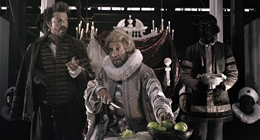 Michael Nyman back in 1991. No soundtrack has come close to matching their work together since, which is a shame, but this one gives it a good shot. Interestingly, this would also make a really fine double feature with a much earlier exploration of the Bible's copious sexual content, which offers a different take on three of the same stories.
Michael Nyman back in 1991. No soundtrack has come close to matching their work together since, which is a shame, but this one gives it a good shot. Interestingly, this would also make a really fine double feature with a much earlier exploration of the Bible's copious sexual content, which offers a different take on three of the same stories.
America hasn't seen a real theatrical release for a Greenaway film since 8 1/2 Women back in 1999, and that's likely to continue to be the case here as various countries have shown this film in festivals but rarely screened it for regular paying audiences. A Blu-ray and DVD edition in the U.K. was first announced by the BFI, but that was quickly replaced with a different edition from Axiom. Either way it's a handsome presentation with a pin-sharp 1.85:1 anamorphic transfer, and the 1080p presentation on the Blu-ray is up there with the best Greenaway HD titles to date. 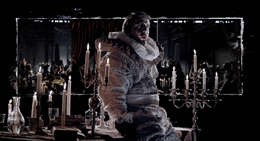 The DTS-HD 5.1 audio is also effective, and you'll probably want to switch on the optional English subtitles a few minutes in for obvious reasons. Extras include a 58-minute interview with Greenaway (who chats about the real Goltzius and the many, many references and influences in this film including erotica and technology, not to mention the history of pubic hair or the lack thereof from ancient Rome to modern porn), Then there's a 10-minute reel of interviews with the cast and crew from the film's French premiere including Greenaway, producer Kees Kasander, co-producer Catherine Dussart, composer Marco Robino, and actresses Anne Louise Hassing and Lisette Malidor. Finally the disc rounds out with a gallery of preparatory drawings by Greenaway for the production and a second gallery of colorful behind-the-scenes photos. Incidentally, the Blu-ray is definitely Region B and will only load up the drawing gallery if a player is set to Region A; be sure you have the right setting, or much confused button pushing will ensue.
The DTS-HD 5.1 audio is also effective, and you'll probably want to switch on the optional English subtitles a few minutes in for obvious reasons. Extras include a 58-minute interview with Greenaway (who chats about the real Goltzius and the many, many references and influences in this film including erotica and technology, not to mention the history of pubic hair or the lack thereof from ancient Rome to modern porn), Then there's a 10-minute reel of interviews with the cast and crew from the film's French premiere including Greenaway, producer Kees Kasander, co-producer Catherine Dussart, composer Marco Robino, and actresses Anne Louise Hassing and Lisette Malidor. Finally the disc rounds out with a gallery of preparatory drawings by Greenaway for the production and a second gallery of colorful behind-the-scenes photos. Incidentally, the Blu-ray is definitely Region B and will only load up the drawing gallery if a player is set to Region A; be sure you have the right setting, or much confused button pushing will ensue.
Reviewed on October 15, 2014.








